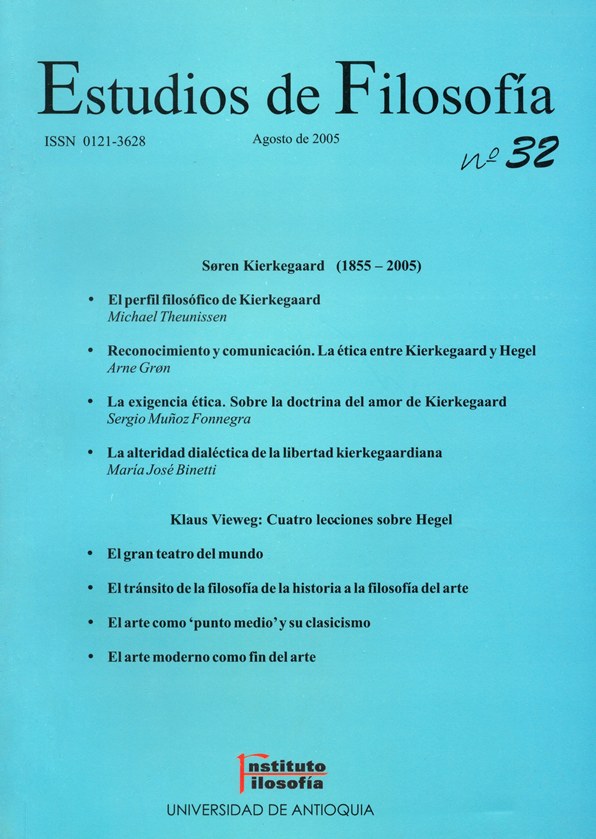Modern art as the end of art. Romanticism as an overcoming of symbolism and classicism
DOI:
https://doi.org/10.17533/udea.ef.12846Keywords:
Modernity, symbolism, subjectivity, humour, poetry, novelAbstract
In the paper the author faces the famous and very diversely interpreted hegelian thesis of the end of art as the supreme way to perceive truth or the spirit. In this confrontation, the author tries to penetrate the significance that modernity has (and this doesn’t mean only modern art), in the context of hegelian philosophy of art In the explanation of such a significance, the author concedes a decisive value to the hegelian concept of “subjectivity”, as a founding concept of modernity and also as an identifier of it. He poses in this conception the speculative horizon from which the idea of the end of an, far from being a sentence of death of art, auto-presents itself as the immanent moment in the realization of the free and spiritualized subjectivity. The end of art would be, therefore, the beginning of the history of human freedom, the beginning of human existence as such.
Downloads
Downloads
Published
How to Cite
License
Copyright (c) 2005 Klaus Vieweg

This work is licensed under a Creative Commons Attribution-NonCommercial-ShareAlike 4.0 International License.
Authors who publish with this journal agree to the following terms:
1. The Author retains copyright in the Work, where the term "Work" shall include all digital objects that may result in subsequent electronic publication or distribution.
2. Upon acceptance of the Work, the author shall grant to the Publisher the right of first publication of the Work.
3. The Author shall grant to the Publisher a nonexclusive perpetual right and license to publish, archive, and make accessible the Work in whole or in part in all forms of media now or hereafter known under a Creative Commons Attribution-NoCommercia-ShareAlike (CC BY-NC-SA 4.0), or its equivalent, which, for the avoidance of doubt, allows others to copy, distribute, and transmit the Work under the following conditions: (a) Attribution: Other users must attribute the Work in the manner specified by the author as indicated on the journal Web site;(b) Noncommercial: Other users (including Publisher) may not use this Work for commercial purposes;
4. The Author is able to enter into separate, additional contractual arrangements for the nonexclusive distribution of the journal's published version of the Work (e.g., post it to an institutional repository or publish it in a book), as long as there is provided in the document an acknowledgement of its initial publication in this journal;
5. Authors are permitted, and Estudios de Filosofía promotes, to post online the preprint manuscript of the Work in institutional repositories or on their Websites prior to and during the submission process, as it can lead to productive exchanges, as well as earlier and greater citation of published work (see The Effect of Open Access). Any such posting made before acceptance and publication of the Work is expected be updated upon publication to include a reference to the Estudios de Filosofía's assigned URL to the Article and its final published version in Estudios de Filosofía.















